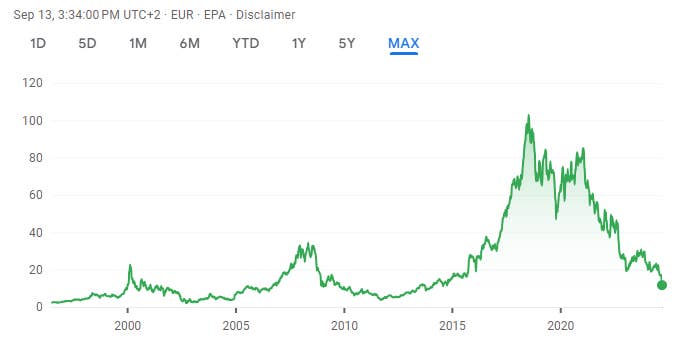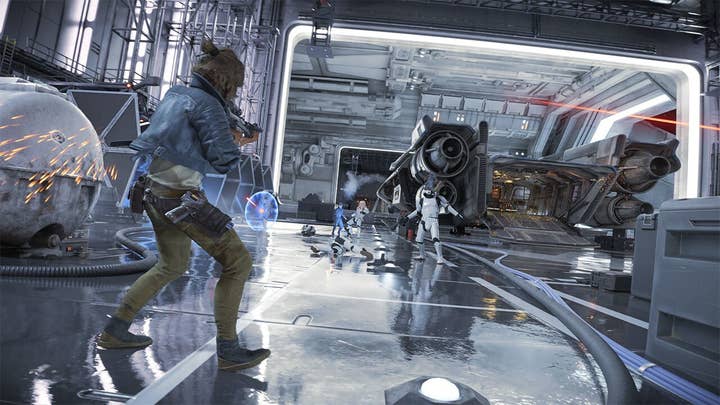
What’s ailing Ubisoft? | Opinion
Since
its
IPO
almost
thirty
years
ago,
the
corporate
history
of
Ubisoft
has
been
defined,
to
some
degree,
by
battles
with
various
attempts
to
take
over
or
wrest
control
of
the
company.
At
the
time
of
that
IPO
it
was
still
primarily
a
European
distributor
for
other
companies’
games,
and
the
ambitions
that
would
lead
it
to
become
a
major
publisher
and
developer
of
its
own
titles
were
still
in
their
infancy.
Within
just
a
few
years,
a
series
of
smart
decisions
had
put
Ubisoft
firmly
on
the
map
as
a
global
publisher
with
a
handful
of
key
IPs
under
its
belt
–
which,
in
turn,
put
it
in
the
crosshairs
of
larger
companies
seeking
to
grow
through
acquisition.
EA
bought
almost
20%
of
the
firm
in
2004,
which
Ubisoft
executives
feared
was
the
prelude
to
a
hostile
takeover
attempt.
EA
ultimately
sold
its
shares
in
2010,
but
just
a
few
years
later
Ubisoft
faced
a
much
more
serious
takeover
attempt,
with
the
founding
Guillemot
family
engaging
in
a
three-year
corporate
battle
to
try
to
prevent
media
giant
Vivendi
from
gaining
a
controlling
share
of
the
company.
You
can
see
the
marks
those
battles
have
left
on
the
company
just
by
zooming
out
on
its
share
price
graph.
If
you
just
look
back
a
few
years,
Ubisoft’s
share
price
performance
looks
thoroughly
miserable,
with
the
company
having
lost
around
half
its
value
in
the
past
year,
and
generally
having
a
wretched
time
of
it
every
year
since
2020.

Image
credit:
Finance
The
pandemic-era
spike
in
valuations
for
games
companies
was
extremely
short-lived
for
Ubisoft;
it
peaked
in
early
2021
and
has
tumbled
precipitously
since
then.
Its
latest
stumble
came
in
the
past
couple
of
weeks
with
share
prices
dropping
off
again
in
the
wake
of
what
appears
to
be
a
commercially
disappointing
launch
for
Star
Wars:
Outlaws.
Look
back
a
bit
further,
though,
and
you
see
some
much-needed
context.
Ubisoft’s
incredibly
high
valuations
in
the
years
running
up
to
2020
were
largely
a
hangover
from
that
corporate
battle
with
Vivendi,
which
saw
the
Guillemot
family
pulling
out
every
trick
in
the
book
to
increase
their
shareholding
and
voting
rights,
while
Vivendi
paid
increasingly
high
prices
to
gobble
up
more
shares
in
search
of
the
elusive
30%
holding
that
would
let
them
trigger
a
tender
for
a
buyout.
These
tactics
worked;
by
the
time
Vivendi
got
near
that
target
in
2017,
Ubisoft’s
share
price
had
soared
to
almost
ten
times
higher
than
it
was
when
Vivendi
bought
its
initial
10%
of
the
stock
in
2015.
Between
that
dramatic
price
tag
inflation
and
the
Guillemots’
various
efforts
to
lock
in
their
control
over
the
company,
Vivendi
ultimately
gave
up,
selling
a
bunch
of
its
shares
to
Tencent
as
it
departed
the
field.
That
left
Ubisoft
with
an
odd
problem
–
a
share
price
that
had
been
inflated
beyond
reason
by
the
corporate
battling,
and
the
inevitability
of
some
very
rough
years
on
the
stock
market
to
come
as
that
price
inevitably
regressed
towards
the
mean.
Ubisoft
remains
an
incredibly
important
part
of
the
games
landscape,
and
everyone
working
in
the
industry,
especially
in
Europe,
would
benefit
from
it
being
in
a
healthier
and
better-managed
state
This
is
not
to
say
that
Ubisoft’s
performance
in
subsequent
years
hasn’t
been
bad
on
its
own
terms
–
it
has,
in
fact,
been
pretty
terrible.
Ubisoft’s
valuation
now
is
somewhere
near
to
where
it
was
back
in
2015
when
Vivendi
first
started
its
bid.
That’s
not
just
mean
regression;
that’s
suggesting
that
the
company
hasn’t
made
meaningful
progress
in
the
past
decade
(at
least
in
the
admittedly
jaundiced
and
often
myopic
eyes
of
the
stock
market).
Investors
in
Ubisoft
have,
at
best,
seen
no
return
at
all
in
that
time;
at
worst,
some
have
seen
nearly
90%
of
the
value
of
their
investment
wiped
out.
The
most
recent
valuation
slides,
as
one
of
the
company’s
two
great
hopes
for
this
year
(the
other
being
Assassin’s
Creed:
Shadows)
has
stumbled
out
of
the
gate,
is
just
insult
to
injury.
You
can
almost
imagine
CEO
Yves
Guillemot
feeling
a
little
relieved,
then,
when
a
so
called
activist
investor
came
out
of
the
woodwork
a
few
days
ago
with
an
open
letter
demanding,
in
essence,
that
Ubisoft
offer
itself
up
for
takeover
by
a
private
equity
company.
Here,
at
least,
is
a
familiar
battleground
for
Ubisoft’s
leadership
–
a
hostile
investor
threatening
to
force
a
takeover
and
defenestrate
the
founding
Guillemot
family!
That’s
a
boss
battle
they’ve
fought
very
successfully
against
far
tougher
opponents
than
a
minor
investor
nobody
has
ever
heard
of
and
who,
by
his
own
admission,
has
owned
less
than
1%
of
Ubisoft
for
about
two
weeks.
It’s
a
far
preferable
fight
to
the
internal
soul-searching
Ubisoft
really
needs
to
be
doing
about
why
it’s
falling
so
far
behind
its
industry
rivals
by
so
many
commercial
metrics,
and
what’s
gone
wrong
with
the
management
of
its
development
pipeline.
I
would
actually
suggest
that
you
go
and
read
the
open
letter
in
question,
because
the
reporting
in
both
the
financial
and
specialist
press
has
arguably
been
a
little
too
kind
to
its
author.
It’s
amateurish
stuff
for
the
most
part,
reading
more
like
an
energy
drink-fuelled
post
on
infamous
meme-stock
spawning
ground
r/WallStreetBets
than
a
serious
piece
of
analysis
or
investment
strategy.
From
consistently
misnaming
some
of
Ubisoft’s
most
important
IPs
to
betraying
an
extremely
surface-level
understanding
of
how
the
games
business
actually
works,
it’s
not
really
the
kind
of
letter
a
major
company
or
its
investors
should
be
taking
seriously.

launch
of
Star
Wars
Outlaws
has
been
followed
by
a
decline
in
Ubisoft’s
share
price
Entirely
unsurprisingly,
the
prescription
offered
for
all
that
ails
Ubisoft
turns
out
to
be
exactly
the
same
snake
oil
that’s
hawked
as
a
corporate
cure-all
in
every
business
–
sell
out
to
private
equity,
who
will
proceed
to
slash
headcount,
sell
off
various
studios
and
other
assets,
and
no
doubt
shake
their
heads
in
sad
surprise
a
few
years
down
the
line
when
the
drained
husk
of
the
company
collapses
in
on
itself.
And
yet.
For
all
that
this
open
letter
has
little
to
offer
either
in
diagnosis
or
prescription
for
Ubisoft’s
ailments…
Well,
the
core
thesis
that
the
ailments
are
bad
and
showing
no
sign
of
improvement
isn’t
wrong,
is
it?
The
basic
facts
are
clear;
Ubisoft
doesn’t
stack
up
well
with
its
publisher
peers
in
terms
of
its
commercial
success.
It
underperforms
by
almost
any
metric,
in
fact;
whether
you
look
at
bottom
line
financial
numbers,
or
slice
them
up
according
to
revenue-per-headcount,
or
consider
the
commercial
performance
on
a
per-title
basis,
Ubisoft
doesn’t
match
up
to
other
companies
in
the
industry.
It
has
a
solid
set
of
well-known
and
popular
IPs
–
Assassin’s
Creed,
Prince
of
Persia,
Tom
Clancy,
Far
Cry,
etc.
–
but
it
has
consistently
struggled
in
recent
years
to
translate
that
into
serious
commercial
success.
Attempts
to
develop
new
IP
haven’t
gone
well
of
late;
Skull
&
Bones
is
the
most
costly
and
high-profile
cock-up
by
some
margin,
but
even
with
seemingly
untroubled
and
smooth
development
cycles,
projects
like
XDefiant
(an
attempt
to
build
a
Call
of
Duty
competitor)
have
seemingly
failed
to
hit
commercial
targets.
These
problems
aren’t
unique
to
Ubisoft,
of
course.
Lots
of
companies
have
projects
that
descend
into
the
depths
of
development
hell
–
though
usually
not
for
quite
as
long,
or
in
quite
such
a
dramatic
way,
as
Skull
&
Bones
did
–
and
almost
every
company
in
the
industry
has
blotted
its
copybook
with
an
attempt
to
snatch
away
some
market
share
from
a
money-printing
machine
like
Call
of
Duty
or
Fortnite
in
recent
years.
Ubisoft’s
core
problem
is
that
it
lacks
its
own
money-printing
machine,
a
business
pillar
like
Activision’s
Call
of
Duty,
EA’s
sports
games,
or
Take
Two’s
GTA
Online
You
could
argue
that
that’s
actually
a
hint
as
to
Ubisoft’s
core
problem:
it
lacks
its
own
money-printing
machine,
a
business
pillar
like
Activision’s
Call
of
Duty,
EA’s
sports
games,
or
Take
Two’s
GTA
Online,
which
reliably
churn
out
large
amounts
of
cash
year
after
year.
Most
of
Ubisoft’s
strategic
decisions
make
some
kind
of
sense
if
you
view
them
as
attempts
to
find
such
a
business
of
their
own,
though
a
less
charitable
take
would
note
that
these
attempts
have
generally
been
pretty
poor
–
XDefiant
is
arguably
the
best
of
them,
but
its
odds
of
snatching
market
share
from
Call
of
Duty
never
looked
especially
good.
Ubisoft
does
have
success
stories,
of
course
–
this
is
still
a
company
with
billions
in
revenue,
let’s
not
pretend
it’s
a
sinking
ship
–
but
investors
aren’t
wrong
to
think
that
performance
could
be
a
lot
better.
There’s
a
fair
argument
to
be
made
that
Ubisoft
is
a
bloated
company
–
its
headcount
is
much
higher
than
comparable
rivals
in
the
industry,
although
in
part
that’s
because
of
a
philosophy
of
keeping
development
in-house
to
a
large
extent,
whereas
many
other
publishers’
true
headcount
is
disguised
by
their
extensive
use
of
outsourcing.
That
doesn’t
tell
the
full
story,
though
–
even
given
that
caveat,
it
remains
the
case
that
Ubisoft
has
a
hell
of
a
lot
of
staff
and
publishes
a
hell
of
a
lot
of
games,
but
fails
to
generate
revenues
on
a
per-employee
or
per-game
basis
that
compare
to
rivals.
That
suggests
a
problem
at
a
high
level
within
the
company;
an
editorial
problem.
Decisions
being
made
at
an
executive
level
are
failing
to
focus
the
company’s
efforts
effectively;
games
are
being
made
en
masse
and
thrown
at
a
wall
to
see
what
will
stick,
which
reflects
a
failure
to
utilise
resources
productively
and
make
smart
decisions
about
the
product
pipeline.

&
Bones
is
Ubisoft’s
most
costly
and
high-profile
cock-up
by
some
margin
That
leads
us,
inevitably,
back
to
the
very
top
of
the
company
–
to
Yves
Guillemot
and
to
the
executives
around
him,
and
the
family
that
has
fought
so
hard
to
maintain
its
grip
on
Ubisoft
over
the
decades.
If
Ubisoft’s
problems
are
editorial,
well,
the
ultimate
arbiter
of
editorial
decision-making
at
a
publisher
is
the
CEO
–
especially
a
founder-CEO
that
has
reigned
for
more
than
30
years
and
whose
family
wields
such
power
within
the
company.
Guillemot
has
truly
fought
tooth
and
nail
to
stay
at
the
top
of
Ubisoft
for
all
these
years,
and
has
shown
himself
to
be
a
crafty
and
resourceful
boardroom
warrior,
using
every
tool
at
his
disposal
to
manoeuvre
between
giant
corporations
like
EA,
Vivendi,
and
Tencent,
even
turning
their
strength
against
one
another
on
occasion
to
suit
his
purposes.
Yet
that
skill
isn’t
the
same
as
the
skill
and
insight
required
to
direct
a
product
slate
or
make
good
strategic
decisions
for
where
a
game
publisher’s
resources
should
be
focused.
It’s
not
unfair
for
investors
to
question
whether
the
current
leadership
has
really
been
showing
those
skills
of
late.
Ubisoft’s
share
price
had
been
inflated
beyond
reason
by
years
of
corporate
battling
The
cure
on
offer
from
the
activist
investor,
of
course,
is
far
worse
than
the
disease.
A
private
equity
firm
coming
in
to
fire
staff
and
strip
assets
would
be
the
death
knell
for
Ubisoft
in
the
medium
term.
Selling
out
to
private
equity
is
the
corporate
equivalent
of
sending
the
horse
to
the
glue
factory,
not
some
magical
pathway
to
improved
management
and
oversight.
Ubisoft
remains
an
incredibly
important
part
of
the
games
industry
landscape,
and
everyone
working
in
the
industry,
especially
in
Europe,
would
ultimately
benefit
from
it
being
in
a
healthier
and
better-managed
state
–
which
will
not
be
achieved
by
bringing
in
a
bunch
of
fresh-faced
MBA-wielders
to
slash
and
burn.
It
may,
however,
also
be
hard
to
achieve
that
healthier
and
better-managed
state
without
real
change
at
the
top
of
the
company.
After
a
bruising
and
poorly-handled
series
of
revelations
in
2020
that
exposed
an
abusive
culture
encompassing
many
senior
staff,
Ubisoft’s
leadership
was
hollowed
out,
but
Guillemot
remained
in
place;
since
then
the
company
has
pivoted
first
to
a
focus
on
mobile
and
F2P,
then
to
an
ill-advised
commitment
to
blockchain,
all
the
while
with
a
product
line-up
looking
increasingly
in
need
of
much
more
effective
editorial
oversight.
With
such
a
powerful
CEO,
there’s
only
one
desk
for
the
buck
to
stop
on.
Yves
Guillemot
has
devoted
much
of
his
life
to
building
this
company,
but
investors
and
stakeholders
are
justified
in
asking,
at
least,
that
he
properly
demonstrate
that
he’s
still
the
right
person
to
lead
it
through
its
current
challenges.






